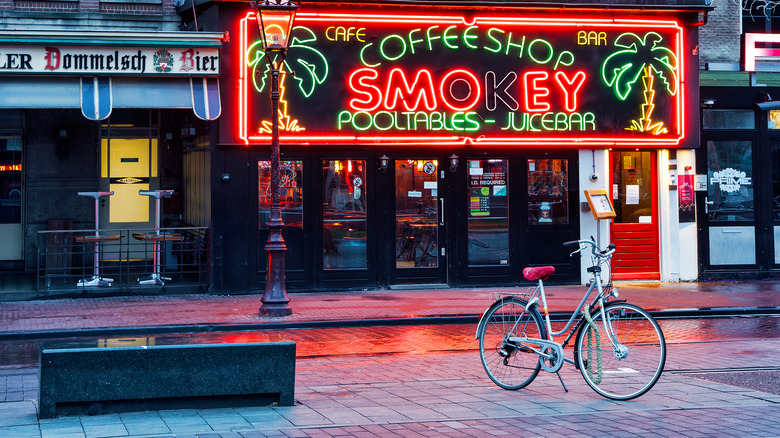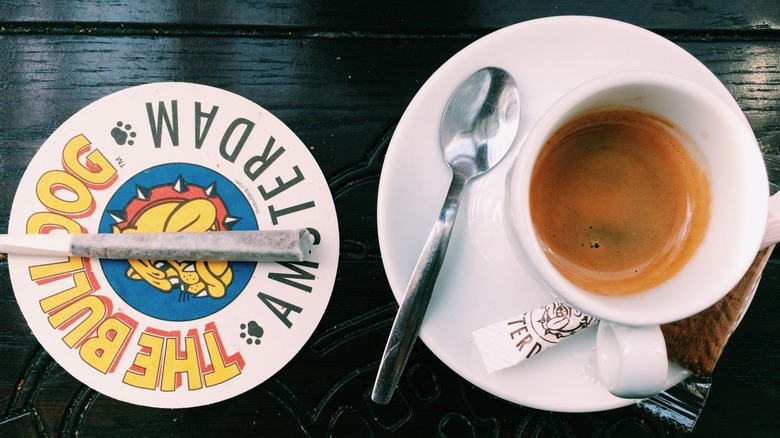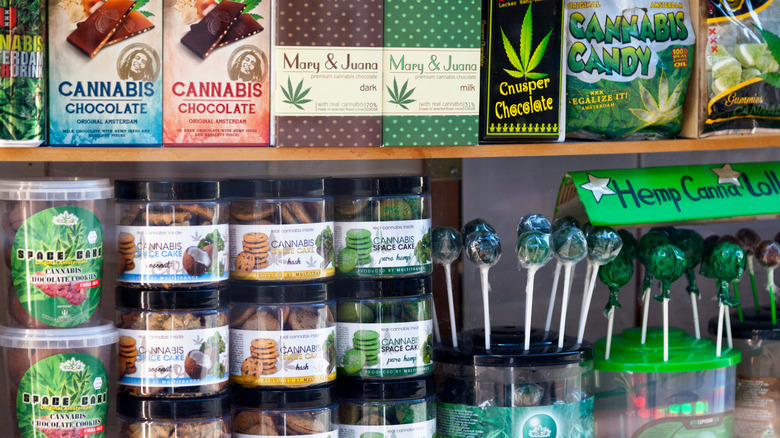Why 'Coffeeshops' Are A Fun Way To Experience Amsterdam Like A Local, Per Rick Steves
When it comes to exploring Amsterdam, a top destination when traveling to the Netherlands, there's a unique cultural element that often catches the eyes — all senses, for that matter — of tourists: the city's famous "coffeeshops." Unlike the typical café where one might expect to sip a latte or an espresso, Amsterdam's coffeeshops offer something a little different: cannabis. Travel expert Rick Steves, who is also an advocate of marijuana decriminalization, recommends experiencing these establishments as a way to immerse yourself in the local culture and get a true taste (or puff) of Amsterdam.
Amsterdam's coffeeshops have been an integral part of the city's culture since the wild heydays of the 1970s. This liberal approach to cannabis, a stark contrast to the strict drug laws in many other countries, is rooted in the Netherlands' pragmatic stance on substance use. The Dutch government quasi-decriminalized the possession of small amounts of cannabis, leading to the rise of coffeeshops where people can legally purchase and consume marijuana in a controlled environment.
Depending on how far down the rabbit hole you want to go, there are also "smartshops," which sell every imaginable natural mind-altering substance, from psilocybin truffles to peyote. However, if you're interested in neither coffeeshops nor smartshops, what you might be looking for is a koffiehuis, or simply a "café." It's difficult to get these three confused: One will smell like roasted coffee beans, one will smell like nothing remarkable, and the one we're focusing on in this article, well, your nose will certainly tell the difference.
The 'coffeeshop' experience in Amsterdam
Rick Steves explains that there are different types of coffeeshop experiences in Amsterdam. Some, like Katsu Coffeeshop, are more intimate, bohemian, and artsy, while others, such as the iconic Bulldog (which has been serving patrons since 1975!), have a more bustling, living-room hangout feel, while Grey Area welcomes the likes of Snoop Dogg and other celebrity cannabis connoisseurs. But no matter what vibe is more up your alley, one thing is for certain: Walking into any Amsterdam coffeeshop, you'll be immediately struck by the laid-back atmosphere. Steves emphasizes that the experience is as much about socializing as it is about purchasing cannabis — customers are welcome to spend hours relaxing, chatting, and enjoying some of the best weed in the city.
Amsterdam's coffeeshop establishments often feature a wide variety of cannabis products displayed on menus — almost like a wine list — that may be discreetly hidden until requested. These menus list a wide array of strains (indica, sativa, or hybrid), nearly all locally grown, in the form of pre-rolled joints (around $5), hashish, flower (one-gram baggies cost around $10 to $15), or edibles — but please be careful when getting a "space cake" unless you quite literally want to go to outer space (if you know, you know). Coffeeshops also offer all the necessary paraphernalia: rolling papers, loaner bongs, vaporizers, and lighters. And, of course, at many coffeeshops, you can also buy some non-alcoholic drinks to stay hydrated and snacks or even full meals for when those munchies kick in.
Practical tips for tourists
Not all coffeeshops are created equal — depending on how you prefer to enjoy your high, it's crucial to pick the right one (old-school websites like Coffeeshop Direct and travel forums can help). Once inside, Rick Steves advises to start with small amounts, especially for those who are new to cannabis or haven't smoked in a while. Many coffeeshops offer strains with varying levels of THC and CBD, allowing patrons to choose according to their comfort level. It's also helpful to ask the staff, or "budtenders," for guidance — they are usually very knowledgeable about their products and can provide valuable advice. If you're flying back to the U.S., be careful if the TSA finds weed in your luggage — what happens in Amsterdam should stay in Amsterdam.
Coffeeshops do have specific rules, such as age restrictions (18 years and older, so bring your ID), cash-only, and no tobacco smoking or sale of alcohol. Despite their popularity, Rick Steves explains that Amsterdam's coffeeshops operate in a legal grey area with strict regulations, such as selling no more than 5 grams of cannabis per person per day and maintaining a limited inventory. While the number of coffeeshops in Amsterdam has decreased from around 350 in 1999 to fewer than 200 today, they remain an integral part of the city — more importantly, they keep the drug trade out of the shadows. For travelers with an open mind, coffeeshops are a fun way to experience Amsterdam like a local, one puff at a time.


